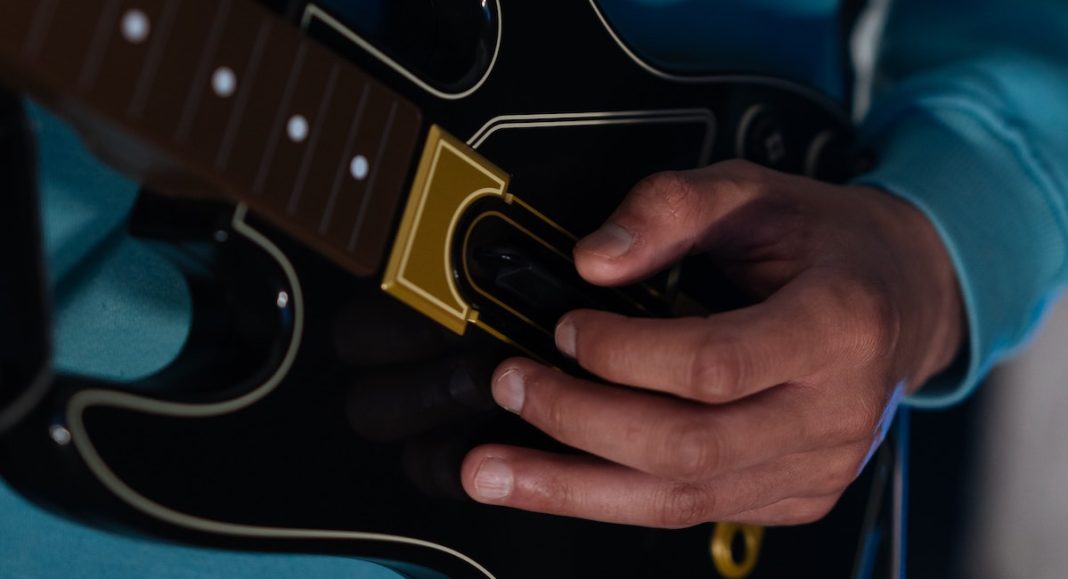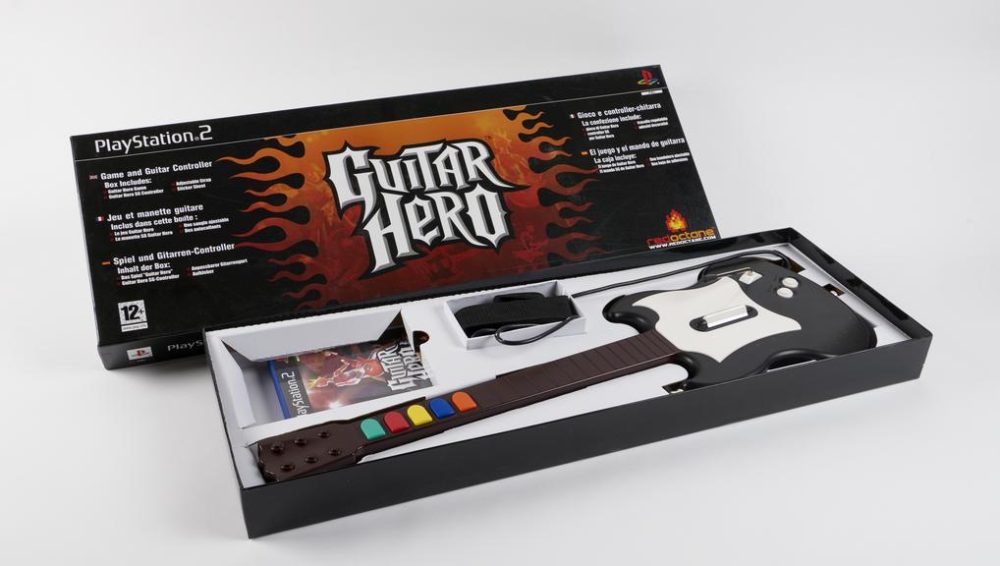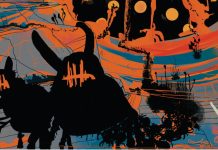The Beat’s Gregory Paul Silber has been accused of having a bit of an… obsessive personality. Each week in Silber Linings, he takes a humorous look at the weirdest, funniest, and most obscure bits of comics and pop culture that he can’t get out of his head.
Chances are, if you were a millennial or Gen Z-er in the mid-to-late 2000s, the Guitar Hero and Rock Band franchises were inescapable, even if you didn’t particularly care for rock music or video games. The moment the original Guitar Hero was released on the Playstation 2 in 2005, it kickstarted a cultural phenomenon that rekindled my generation’s interest in guitar-driven music from our parents and even grandparents’ generations. Then in 2007, founding Guitar Hero developer Harmonix departed from publisher Activision to create the Rock Band series for MTV Games, and as many as four players could replicate the feel of being rockstars at the same time, playing the roles of bassist, drummer, singer, and of course, guitarist. It was a staple of sleepovers, parties, and other teen hangouts throughout my high school years and well into college. It was how I bonded with friends and discovered music I still love to this day, and I know many people around my age had similar experiences.
The last Guitar Hero game, Guitar Hero Live, was released in 2015, with Rock Band 4, the final game to date of that series, released that same year, and by then both games were attempts to revitalize a franchise that had already peaked years earlier. Writing this now in 2022, the rock game trend is largely looked back upon as an early 21st century fad that’s long since out of vogue. I suspect that the inherent silliness of mimicking the feel of playing classic rock songs on plastic toy guitars and drums is still remembered with some of the same disdain that it was criticized for then; “why wouldn’t you just learn to play a real guitar?”
So now that the dust has settled on an out-of-fashion frivolity, let’s talk about why these games made such a big impact, why they lost their grip on the zeitgeist, and why I still look back on them with affection many years since I last used my “Star Power.”
I first played Guitar Hero at an overpriced video game cafe-type-thing in my hometown of Wayne, New Jersey during my freshman year of high school. I don’t remember the name of the place and googling hasn’t yielded any familiar results. It wasn’t an arcade per se, but a place where you’d pay something like $10 an hour to play commercially-available video games on high-end PCs and a variety of home consoles. It was sort of like paying to visit the house of that rich kid in your school whose parents bought him all the video games he wanted, and it was conveniently located in the same strip mall as a GameStop, the local movie theater, and a decent-enough pizzeria that would do in a pinch if you didn’t feel like walking a quarter-mile or so to the far superior pizzeria down the road.
Anyway, I was subscribed to Playstation Magazine at the time, and they gave a 4.5 out of 5 to Guitar Hero, so I figured I’d give it a try. Praising the diverse soundtrack representing a wide variety of rock sub-genres and eras, I remember the critic saying something like “there’s something for everyone here, unless you really can’t stand rock music.” Well, I’ve always loved rock and roll. I was a late bloomer when it came to embracing my own music tastes and hadn’t come into my own yet, but I was raised on a steady diet of classic rock. The soundtrack to the first game, albeit much slimmer than future games in the series, featured an impressive selection of familiar classics like “Smoke on the Water” by Deep Purple and “Iron Man” by Black Sabbath, as well as contemporary hits like “No One Knows” by Queens of the Stone Age and “Take Me Out” by Franz Ferdinand – the latter of which had helped jumpstart my interest in alternative rock when it was a Top 40 hit the year prior.
My history with actually playing music was much messier. I had quit the trumpet in middle school, mostly because everyone in my band class – the other kids, and also my teacher – were bullies, but frankly, the trumpet was probably the wrong instrument for me to begin with. I appreciate classical and jazz music, and I went through a ska-punk phase in high school and college, but if I was going to learn an instrument it should’ve been the guitar. Rock has always been my preferred genre, and even when I listen to other genres like pop or hip-hop, the guitar is the instrument for which I have the keenest ear.
“I can tell you’ve never played guitar before,” said the 20-something employee of that video game cafe when he saw me awkwardly trying to adjust the strap on the guitar controller. He took a moment to teach me the basics of where my hands should go before leaving me to fend for myself. But even playing on Easy mode (I eventually became competent enough to play most songs on Expert), the moment I struck a note in time with a very close facsimile of Joan Jett, I was hooked.
The magic of the Guitar Hero and Rock Band games wasn’t just that they made you feel like a rock star, although that was always the key selling point. It was that the nature of the gameplay forced you to pay attention to every individual note, thus enhancing your appreciation of the music itself.
My paternal grandfather, born in the late 1920s, is the most passionate audiophile I’ve ever met and probably ever will meet. He’s accumulated thousands – maybe even tens of thousands – of records over the decades and has given away more albums than most people will ever listen to. Even still, in his 90s, his favorite hobby is to sit in his living room with his massive stereo system and listen to music. Chamber music is his preferred genre, and he gravitates towards classical music in general, but he keeps an open mind and is happy to throw on a contemporary pop album if he thinks it’ll have good audio quality. He just sits on the couch and listens to music. It’s not just background music for when he’s cleaning the house or looking at his phone (not that he’d do that anyway; he hates cell phones). He just sits there and listens to music.
Most people in my generation don’t do that. I’m just as guilty as anyone else. As important as music is to me, I rarely take the time to let music be my primary focus, unless I’m at a concert. There’s nothing necessarily wrong with letting music act as background noise, but if that’s all music ever is to you, are you getting as much out of it as you could be?
Video games, however, are not a passive activity. When you play a Guitar Hero or Rock Band game, your mind and body has to be focused on hitting the right buttons to correspond with the notes onscreen. Notes only play when you “strum,” and if you hit the wrong note, unpleasant sound effects play instead. Play poorly enough and the virtual audience groans and eventually boos you offstage, ending the song prematurely.
The desire to play well enough for good scores and supportive “fans” not only improves player performance, but appreciation of the songs themselves. You have no choice but to listen to every single note. I didn’t care much for heavy metal, for example, until guitar games made me realize how talented, even athletic, you have to be to play so many notes correctly in quick succession during a wild solo.
With all the time I spent playing these games, couldn’t I have just learned to play a real guitar? I dunno, I guess. The learning curve would’ve been steeper, though, and even if I could teach myself to play rather than spending the money on lessons, a decent electric guitar, along with an amplifier and related necessary equipment, probably would’ve been more expensive than a video game console, let alone the cost of a Guitar Hero or Rock Band game itself.
Besides, at the end of the day I never really cared that I couldn’t actually play guitar (or bass, or drums… also I’m a pretty lousy singer). Yelling at kids that playing these games wasn’t the same as playing real instruments was kind of like yelling at pro wrestling fans “it’s fake, you know!” We all know it’s fake. Lots of things people enjoy are fake. That doesn’t make them less fun. Nobody who played music games thought they were substitutes for the real thing, although it did spark enough interest for some kids to ask their parents for real guitars. I never bothered, but my love for the music was real.
Naturally, learning to develop a greater appreciation for the music made a me a fan of several artists I might not have previously taken the time to get into. For example, I discovered one of my favorite bands, Silversun Pickups (more like SILBERSUN Pickups amirite?!?!?!?!) (Ed. Note: No. -JG) when one of their earliest singles, a dynamic slow-burn epic called “Lazy Eye,” was featured on 2008’s Guitar Hero: World Tour alongside more familiar favorites like “Hotel California” by The Eagles and “Santeria” by Sublime. Seeing these songs performed by generic animated avatars also removed some preconceived notions one might have about an artist’s appearance. The first several times I heard “Lazy Eye,” I assumed the sweet, high-pitched vocals belonged to a woman. It wasn’t until months later, when I saw the music video from “Panic Switch” off of their next album, that I realized frontman Brian Aubert was a man. There is a woman in the band, bassist Nikki Monninger, but she only sings occasional backup.
Nikki rocks too, by the way. “Panic Switch” boasts my favorite bass line of all time.
There are several other artists that I discovered, or developed a greater appreciation for, because of these games. I knew of Nirvana before and had heard “Smells Like Teen Spirit” plenty of times throughout my life, but it wasn’t until I engaged with the soft-loud-soft-loud dynamics of “Heart Shaped Box” on Guitar Hero II that I got on the path to proclaiming them my all-time favorite band, which they still are. I had only vaguely heard of the Yeah Yeah Yeahs before singing “Maps” on the original Rock Band with my then-girlfriend while she played guitar, but now it’s a go-to karaoke song. I had never even heard of Rilo Kiley before Rock Band 3 – the only one of these games to boast a keyboard component – but damn if frontwoman Jenny Lewis didn’t write one of the most devastatingly bittersweet indie rock songs of all time.
I suspect that if the Guitar Hero and Rock Band series’ didn’t oversaturate themselves so quickly, their popularity would’ve lasted much longer. There’s no shortage of great rock songs in the world, and new bands keep cropping up that would’ve fit right into those games, but there is a finite number of iconic classics that these games ate through pretty quickly. Multiple games in these series were released per year for almost a decade, including handheld versions, mobile games, themed spin-offs like Guitar Hero Encore: Rocks the 80s and Lego Rock Band, and band-specific entries like The Beatles Rock Band. Not only that, but in addition to the songs included on-disc in each game, additional downloadable songs were made available for purchase each week. There are a handful of great songs on the soundtracks of both Rock Band 4 and Guitar Hero Live, but a look at those “setlists” indicates that much of the best of the available rock canon had already been burned through in previous games.
Phil Spencer, the head of gaming at Microsoft, recently expressed interest in reviving the dormant Guitar Hero franchise. I’m skeptical. I’d be happy to play one of those games again, even (especially?) if it recycled a bunch of previously-used songs, but will anyone else – especially a new generation of kids – have any interest? Where else can the franchise even go at this point?
I don’t know, but I’ll always be affectionate towards the original Guitar Hero/Rock Band era. They were a great way to discover cool music, bond with peers, and even find common ground with older people who were pleasantly confounded by 90s kids taking an interest in Boomer acts like The Rolling Stones and The Who. Some of the best times I ever had were playing Blue Öyster Cult in some kid’s basement.








